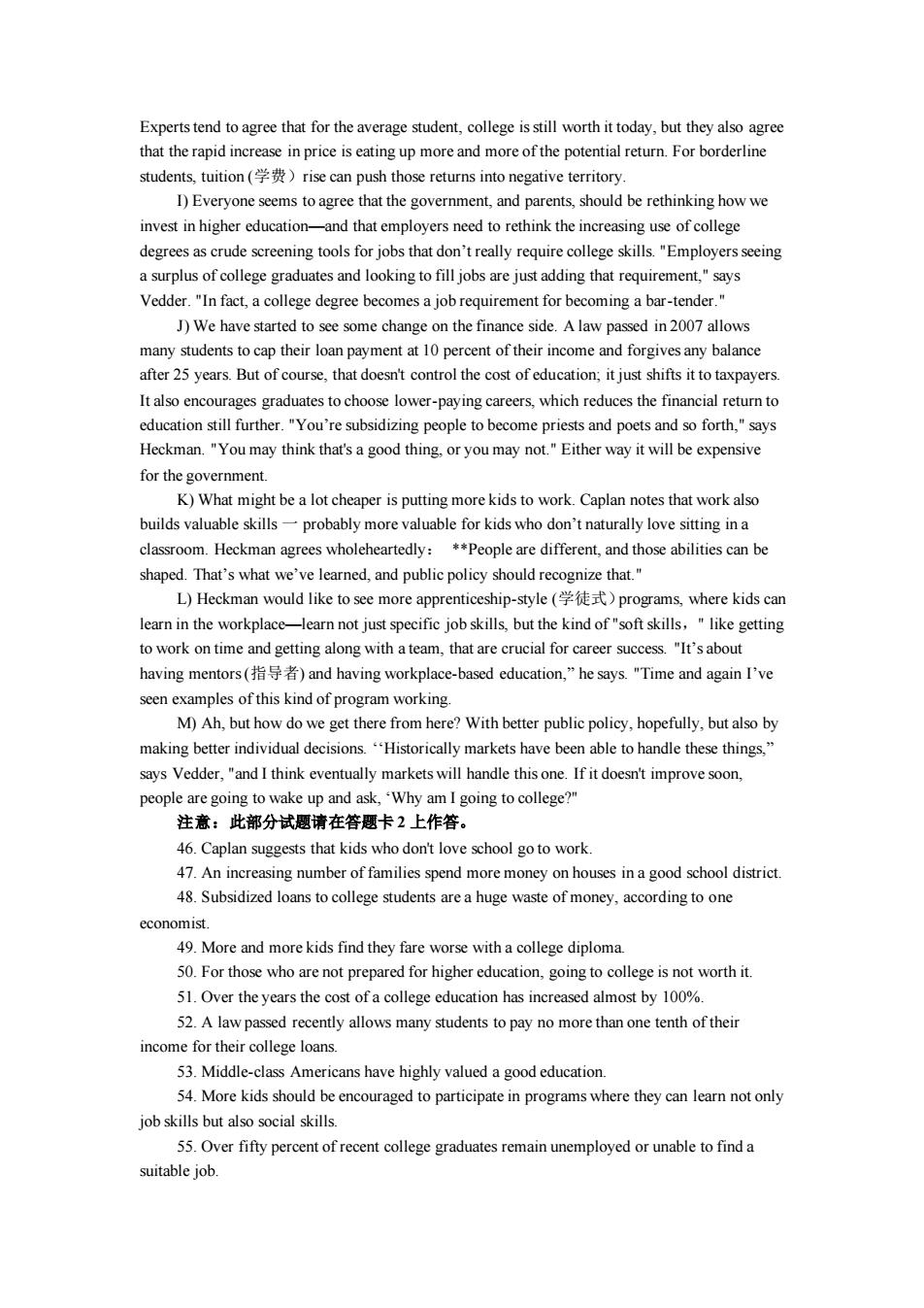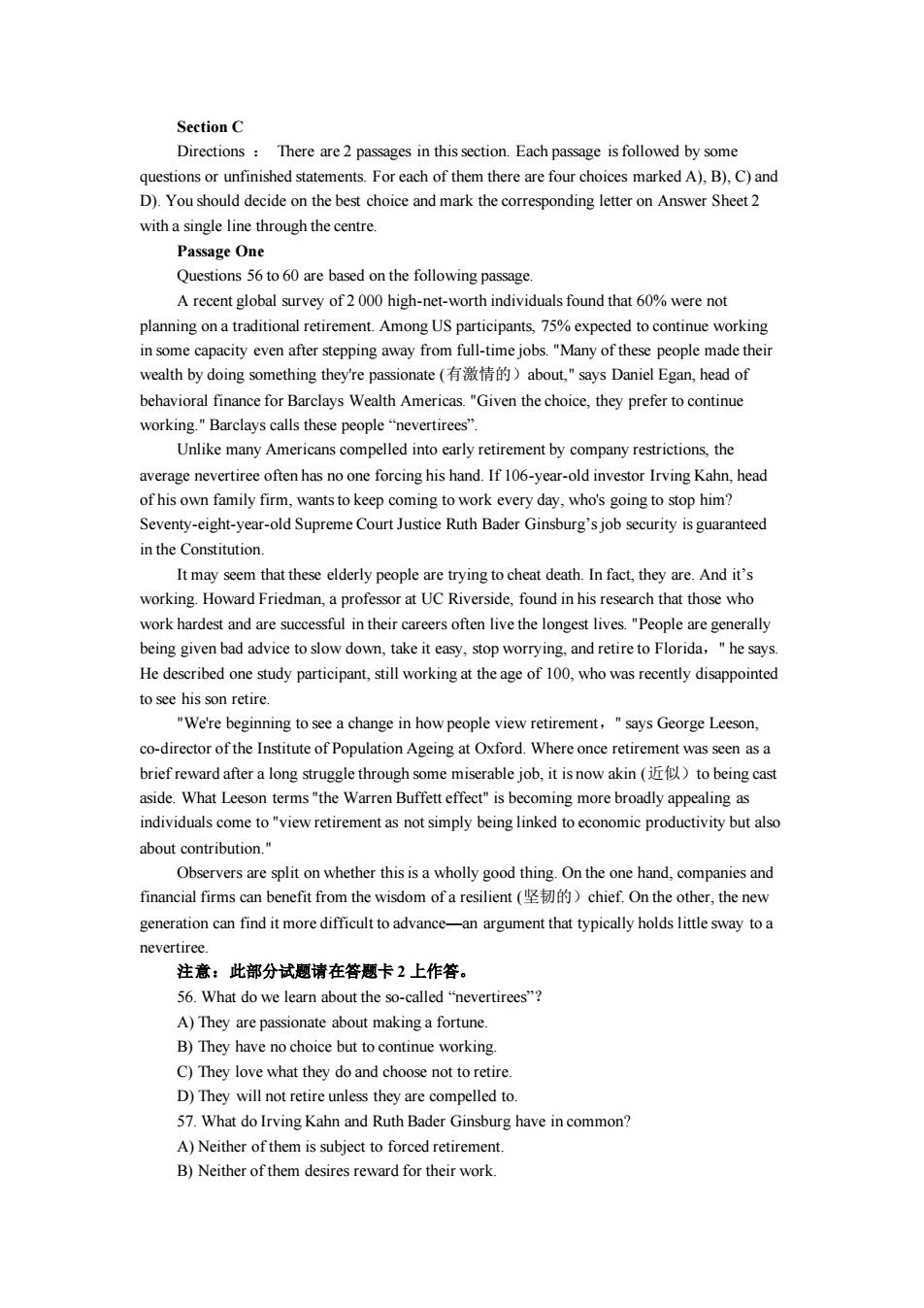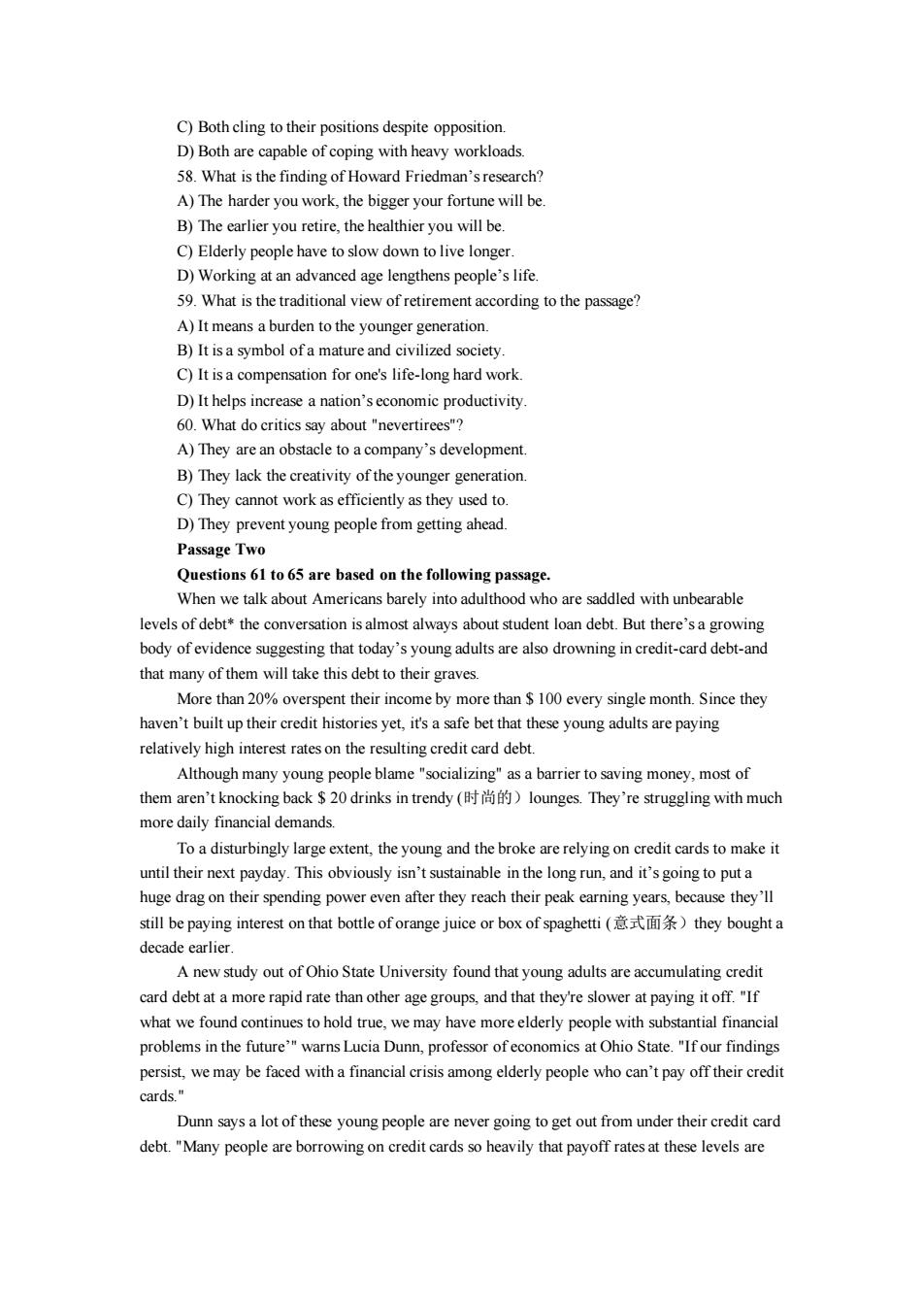
Expertstend that for the average isst worth it today.but they alsoag that the inprice is eatingup moreand more ofthe potential retur For borderin students,tuition (rise can push those returns into negative territory. 1)Everyone seems to agree that the government,and parents,should be rethinking how we invest in higher education-and that employers need to rethink the increasing use of college degrees as rude for jobs that don'reallyrequrecoe skillsEmployers sen a surplus of college graduates and looking to fill jobs are just adding that requirement,"says Vedder."In fact,a college degree becomes a job requirement for becoming a bar-tender." J)We have started to see some change on the finance side.A law passed in 2007 allows of their inome and forg sany balance after 25 years.But of course,that doesn't control the cost of education;it just shifts it to taxpayers It also encourages graduates to choose lower-paying careers,which reduces the financial return to education still further."You're subsidizing people to become priests and poets and so forth."savs Heckman."You may think that's a good thing.or you may not"Either way it will be expensive for the government K)What might be a lot cheaper is putting more kids to work.Caplan notes that work also builds valuable skills-probably more valuable for kids who don't naturally love sitting in a Heckman agrees wholeheartedly:Peope are different,and those abilities can be shaped.That's what we've learned,and public policy should recognize that. L)Heckman would like to see more apprenticeship-style (programs.where kids can learn in the workplace-learn not just specific job skills,but the kind of"soft skills,"like getting to work on time and getting along with ateam,that are crucial for career sue"'sabout having mentors()and having workplace-based education,"he saysTm and again I'v seen examples of this kind of program working. M)Ah,but how do we get there from here?With better public policy,hopefully,but also by making better markets have been abe. says Vedder,andI think eventually markets will handle thisone.If it do improve soon people are going to wake up and ask,Why am I going to college? 注意:此部分试题请在答题卡2上作答。 46.Caplan suggests that kids who don't love school go to work. 47.An increa ing number of families pend more money onhouses ina good shool distric 48.Subsidized loans to college students are a huge waste of money,according to one economist 49 More and more kids find they fare worse with a college diploma 50.For those who renot prepared for,goingt college is not worth it. 51.Over the years the cost of a college education has increased almost by 100% 52.A law passed recently allows many students to pay no more than one tenth of their income for their college loans 53.Middle-class Americans have highly valued a good education 54.More kids should be encouraged to participate in programs where they can learn not ony job skills but also social skills 55.Over fifty percent of recent college graduates remain unemployed or unable to find a suitable job
Experts tend to agree that for the average student, college is still worth it today, but they also agree that the rapid increase in price is eating up more and more of the potential return. For borderline students, tuition (学费)rise can push those returns into negative territory. I) Everyone seems to agree that the government, and parents, should be rethinking how we invest in higher education—and that employers need to rethink the increasing use of college degrees as crude screening tools for jobs that don’t really require college skills. "Employers seeing a surplus of college graduates and looking to fill jobs are just adding that requirement," says Vedder. "In fact, a college degree becomes a job requirement for becoming a bar-tender." J) We have started to see some change on the finance side. A law passed in 2007 allows many students to cap their loan payment at 10 percent of their income and forgives any balance after 25 years. But of course, that doesn't control the cost of education; it just shifts it to taxpayers. It also encourages graduates to choose lower-paying careers, which reduces the financial return to education still further. "You’re subsidizing people to become priests and poets and so forth," says Heckman. "You may think that's a good thing, or you may not." Either way it will be expensive for the government. K) What might be a lot cheaper is putting more kids to work. Caplan notes that work also builds valuable skills 一 probably more valuable for kids who don’t naturally love sitting in a classroom. Heckman agrees wholeheartedly: **People are different, and those abilities can be shaped. That’s what we’ve learned, and public policy should recognize that." L) Heckman would like to see more apprenticeship-style (学徒式)programs, where kids can learn in the workplace—learn not just specific job skills, but the kind of "soft skills," like getting to work on time and getting along with a team, that are crucial for career success. "It’s about having mentors (指导者) and having workplace-based education,” he says. "Time and again I’ve seen examples of this kind of program working. M) Ah, but how do we get there from here? With better public policy, hopefully, but also by making better individual decisions. ‘‘Historically markets have been able to handle these things,” says Vedder, "and I think eventually markets will handle this one. If it doesn't improve soon, people are going to wake up and ask, ‘Why am I going to college?" 注意:此部分试题请在答题卡 2 上作答。 46. Caplan suggests that kids who don't love school go to work. 47. An increasing number of families spend more money on houses in a good school district. 48. Subsidized loans to college students are a huge waste of money, according to one economist. 49. More and more kids find they fare worse with a college diploma. 50. For those who are not prepared for higher education, going to college is not worth it. 51. Over the years the cost of a college education has increased almost by 100%. 52. A law passed recently allows many students to pay no more than one tenth of their income for their college loans. 53. Middle-class Americans have highly valued a good education. 54. More kids should be encouraged to participate in programs where they can learn not only job skills but also social skills. 55. Over fifty percent of recent college graduates remain unemployed or unable to find a suitable job

Directions There are passages in this section.Each passage is followed by some questions or unfinished statements.For each of them there are four choices marked A),B).C)and D).You should decide on the best choice and mark the corresponding letter on Answer Sheet 2 with a single line through the centre. Passage On Questions 56 to 60 are based on the following passage A recent global survey of 2000 high-net-worth individuals found that 60%were not planning ona traditional retirement Among US participants,75%expected working in some capacity even after stepping away from fu me jobs Many of these people made their wealth by doing something they're passionate(有激情的)about,"says Daniel Egan,head o behavioral finance for Barclays Wealth Americas."Given the choice,they prefer to continue working"Barclays calls these people"nevertirees". Unlike many Americans compelled into early retirement by company restrictions,the average nevertiree often has noone forcing his hand.If 106-year-old investor Irving Kahn,head of his own family firm,wants to keep coming to work every day,who's going to stop him? Seventy-eight-vear-old Supreme Court Justice ruth Bader ginsburg's iob security is guaranteed n the Constitutior It may seem that these elderly people are trying to cheat death.In fact,they are.And it's working.Howard Friedman,a professor at UC Riverside,found in his research that those who work hardest and are successful in their careers often live the longest lives."People are generally being given He described one study participant,still working at the age of 100,who was recenty disappointed to see his son retire. "We're beginning to see a change in how people view retirement,"says George Leeson. o-director ofthe Institute of Popuation Ageing at Oxford.Whereone ret was seen as brief reward after a long struggle through some miserable job,it isnow akin (to being cast aside.What Leeson terms"the Warren Buffett effect"is becoming more broadly appealing as individuals come to"view retirement as not simply being linked to economic productivity but also about contribution." Ob rvers are split on whether this is a wholly good thing.On the one hand,companies and financial firms can benefit from the wisdom of a resilient (chief.On the other,the new generation can find it more difficult to advance-an argument that typically holds little sway to a 注意:此部分试题请在答题卡2上作答 56.What do we learn about the so-called "nevertirees"? A)They are passionate about makinga fortune. B)They have no choice but to continue working C)They love what they do and hoose not to retir D)They will not retire unless they are compelled to. 57.What do Irving Kahn and Ruth Bader Ginsburg have in common? A)Neither ofthem is subject to forced retirement. B)Neither of them desires reward for their work
Section C Directions : There are 2 passages in this section. Each passage is followed by some questions or unfinished statements. For each of them there are four choices marked A), B), C) and D). You should decide on the best choice and mark the corresponding letter on Answer Sheet 2 with a single line through the centre. Passage One Questions 56 to 60 are based on the following passage. A recent global survey of 2 000 high-net-worth individuals found that 60% were not planning on a traditional retirement. Among US participants, 75% expected to continue working in some capacity even after stepping away from full-time jobs. "Many of these people made their wealth by doing something they're passionate (有激情的)about," says Daniel Egan, head of behavioral finance for Barclays Wealth Americas. "Given the choice, they prefer to continue working." Barclays calls these people “nevertirees”. Unlike many Americans compelled into early retirement by company restrictions, the average nevertiree often has no one forcing his hand. If 106-year-old investor Irving Kahn, head of his own family firm, wants to keep coming to work every day, who's going to stop him? Seventy-eight-year-old Supreme Court Justice Ruth Bader Ginsburg’s job security is guaranteed in the Constitution. It may seem that these elderly people are trying to cheat death. In fact, they are. And it’s working. Howard Friedman, a professor at UC Riverside, found in his research that those who work hardest and are successful in their careers often live the longest lives. "People are generally being given bad advice to slow down, take it easy, stop worrying, and retire to Florida," he says. He described one study participant, still working at the age of 100, who was recently disappointed to see his son retire. "We're beginning to see a change in how people view retirement," says George Leeson, co-director of the Institute of Population Ageing at Oxford. Where once retirement was seen as a brief reward after a long struggle through some miserable job, it is now akin (近似)to being cast aside. What Leeson terms "the Warren Buffett effect" is becoming more broadly appealing as individuals come to "view retirement as not simply being linked to economic productivity but also about contribution." Observers are split on whether this is a wholly good thing. On the one hand, companies and financial firms can benefit from the wisdom of a resilient (坚韧的)chief. On the other, the new generation can find it more difficult to advance—an argument that typically holds little sway to a nevertiree. 注意:此部分试题请在答题卡 2 上作答。 56. What do we learn about the so-called “nevertirees”? A) They are passionate about making a fortune. B) They have no choice but to continue working. C) They love what they do and choose not to retire. D) They will not retire unless they are compelled to. 57. What do Irving Kahn and Ruth Bader Ginsburg have in common? A) Neither of them is subject to forced retirement. B) Neither of them desires reward for their work

C)Both cling totheir positions despite opposition 58.What is the finding of Howard Friedman's research A)The harder you work,the bigger your fortune will be. B)The earlier you retire the healthier you will be C)Elderly people have toslow down toive onge D)Working at an advanced age lengthens people's life 59.What is the traditional view of retirement according to the passage? A)It means a burden to the younger generation. B)It isa symbol of mature and vilized C)It isa compensation for one's life-long hard worl D)It helps increase a nation's economic productivity 60.What do critics say about "nevertirees"? A)They are an obstacle toacompany's development B)They lack the creativity of the younger generation C)They cannot work as efficiently as they used to D)They prevent young people from getting ahead Passage Tw Questions 61 to 65 are based on the following passage. When we talk about Americans barely into adulthood who are saddled with unbearable levels of debt*the conversation is almost always about student loan debt.But there's a growing esting that today'syoungadultsrelsodrowning that many of them will take this debt to their graves More than 20%overspent their income by more than 100 every single month.Since they haven't built up their credit histories yet,it's a safe bet that these young adults are paying relatively high debt. Although many young people blame""asa barrier to saving money,moso them aren't knocking back 20 drinks in trendy (lounges.They're struggling with much more daily financial demands. unti their next payday.This obviously isn ainable in the longrun,and it's going to puta huge drag on their spending power even after they reach their peak earning years,because they'll still be paying interest on that bottle of orange juice or box of spaghetti(意式面条)they bought a decade earlier. A new studyou University found that card debt at a more rapid rate than other age groups,and that they're slower at paying it off."If what we found continues to hold true,we may have more elderly people with substantial financial problems in the future'"warns Lucia Dunn,professor of economics at Ohio State."If our findings may be faced with a finaneial riss among elderly people wh can'tpay off Dunn says a lot of these young people are never going to get out from under their credit card debt."Many people are borrowing on credit cards so heavily that payoff rates at these levels are
C) Both cling to their positions despite opposition. D) Both are capable of coping with heavy workloads. 58. What is the finding of Howard Friedman’s research? A) The harder you work, the bigger your fortune will be. B) The earlier you retire, the healthier you will be. C) Elderly people have to slow down to live longer. D) Working at an advanced age lengthens people’s life. 59. What is the traditional view of retirement according to the passage? A) It means a burden to the younger generation. B) It is a symbol of a mature and civilized society. C) It is a compensation for one's life-long hard work. D) It helps increase a nation’s economic productivity. 60. What do critics say about "nevertirees"? A) They are an obstacle to a company’s development. B) They lack the creativity of the younger generation. C) They cannot work as efficiently as they used to. D) They prevent young people from getting ahead. Passage Two Questions 61 to 65 are based on the following passage. When we talk about Americans barely into adulthood who are saddled with unbearable levels of debt* the conversation is almost always about student loan debt. But there’s a growing body of evidence suggesting that today’s young adults are also drowning in credit-card debt-and that many of them will take this debt to their graves. More than 20% overspent their income by more than $ 100 every single month. Since they haven’t built up their credit histories yet, it's a safe bet that these young adults are paying relatively high interest rates on the resulting credit card debt. Although many young people blame "socializing" as a barrier to saving money, most of them aren’t knocking back $ 20 drinks in trendy (时尚的)lounges. They’re struggling with much more daily financial demands. To a disturbingly large extent, the young and the broke are relying on credit cards to make it until their next payday. This obviously isn’t sustainable in the long run, and it’s going to put a huge drag on their spending power even after they reach their peak earning years, because they’ll still be paying interest on that bottle of orange juice or box of spaghetti (意式面条)they bought a decade earlier. A new study out of Ohio State University found that young adults are accumulating credit card debt at a more rapid rate than other age groups, and that they're slower at paying it off. "If what we found continues to hold true, we may have more elderly people with substantial financial problems in the future’" warns Lucia Dunn, professor of economics at Ohio State. "If our findings persist, we may be faced with a financial crisis among elderly people who can’t pay off their credit cards." Dunn says a lot of these young people are never going to get out from under their credit card debt. "Many people are borrowing on credit cards so heavily that payoff rates at these levels are